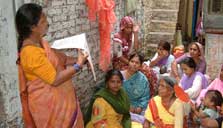I remember sitting in a small room at Trinity Western University, British Columbia on a hot day in July 2003, hearing about an exciting, new, joint initiative of the World Evangelical Alliance and the Micah Network for Integral Mission. Called ‘The Micah Challenge’, its aim was to wake the worldwide church up to the opportunity to campaign for real change for the world’s poor. This chance was afforded by the Millennium Development Goals (MDGs), agreed three years earlier by the Millennium Summit of the UN. Eight goals, with concrete targets, aimed at spurring governments and global institutions to bring about measurable change for the world’s poor.
The deadline for achieving these goals was this year. Twelve years on, the UN is about to get its members to agree to a new set of ‘Sustainable Development Goals’ (SDGs) set to run until 2030. It’s hard to believe that we are here, looking back at one and a half decades of activism, prayer, hard work and dedication by so many people, Christians and those of other faiths and no faith. And there is definite progress to report – we have seen the proportion of people living on less than $1.25 a day drop from 47% to 14% between 1990 and 2015, and the number living on more than $4 a day triple. Global under-five mortality rates have halved, the maternal mortality rate has declined 45% and new HIV infections by 40%. 15 million people with HIV are now on antiretroviral treatment – nearly 43% of all those living with the virus. These achievements collaboratively sought and executed are all to be celebrated.
Of course, that’s the ‘glass is half full’ scenario. On the other side of the coin, women are still far more likely than men to live in extreme poverty; in rural areas only 56% of women have access to skilled health personnel (compared to 87% in urban areas). 40% of people live with water scarcity, and that proportion is increasing. And by the end of 2014, conflicts had driven nearly 60 million people to flee their homes – nearly 20 million from the Iraqi and Syrian wars alone!
And as a recent report from the Lancet highlights, the health and development gains we have made have been at the expense of future generations, because of the cost to our natural environment of industrialisation, population movements and urbanisation. Environmental degradation may well be one of the biggest causes of health problems in the coming decades.
The new SDGs seek to address these environmental issues and the complex needs of our interconnected world. Maybe they are too comprehensive. Seventeen goals, each with a series of targets and ‘enablers’ mean that there are currently at least 169 indicators to be measured. The costs and complexities of this are baffling, and the means to finance the SDGs are already in question after a very recent funding summit in Addis Ababa.
However, while the MDGs only focused on three health areas (maternal health, child health, communicable diseases), the SDGs focus on a wider approach to health, including universal health coverage, and a recognition of social determinants of health within the other sixteen goals. The goal is about achieving well-being for all at all ages – not just focusing on the young and those with certain illnesses. If implemented in full, this could revolutionise the health of the world’s poor over the next fifteen years.
This all begs a deeper question – do these sorts of goals and targets actually work? I have been and remain slightly sceptical. The reduction in global poverty, much trumpeted, is actually due to the massive economic growth of China, Brazil and India over the last couple of decades. Many countries in sub-Saharan Africa have seen deterioration in incomes. By focusing on certain areas of health, others (such as tropical illnesses and most notably, non-communicable diseases) have been dangerously neglected by funders. The new goals on the other hand, in seeking to be less selective and more all-encompassing, may run the paradoxical risk of having no focus and therefore neglecting major problems.
A further problem we have highlighted repeatedly (see here and here) is that there is no language in any of the SDG documents over the last three years that explicitly acknowledges the role of faith communities and organisations in development. This is despite our long standing (often centuries or even millennia old) presence within developing world communities. Indeed recent research suggests that Christian organisations have a greater penetration into poor rural communities in Africa than any other group.
This attitude is changing however, and increasingly the international community is acknowledging our role in many areas. A possible sign of this is that the SDG Summit at the end of September is due to be opened by an address from Pope Francis – clearly acknowledging his role in speaking up for the poor in the spirit of Proverbs 31:8. But while many international bodies want to work constructively with us, many national governments and local entities are not so keen, for many reasons.
It will be what we do on the ground in the coming decade that will determine whether the SDGs will work. High level discussions, funding and resourcing are vital, but local leadership and community engagement will be where the real ‘bread and butter’ is. Will national governments and local health bodies work with us? The evidence suggests that if you want to turn around the poor healthcare and poverty in the remotest rural areas, it may be the churches and the mission agencies to which you will have to turn.
In the meantime, we continue to watch, pray and serve.




